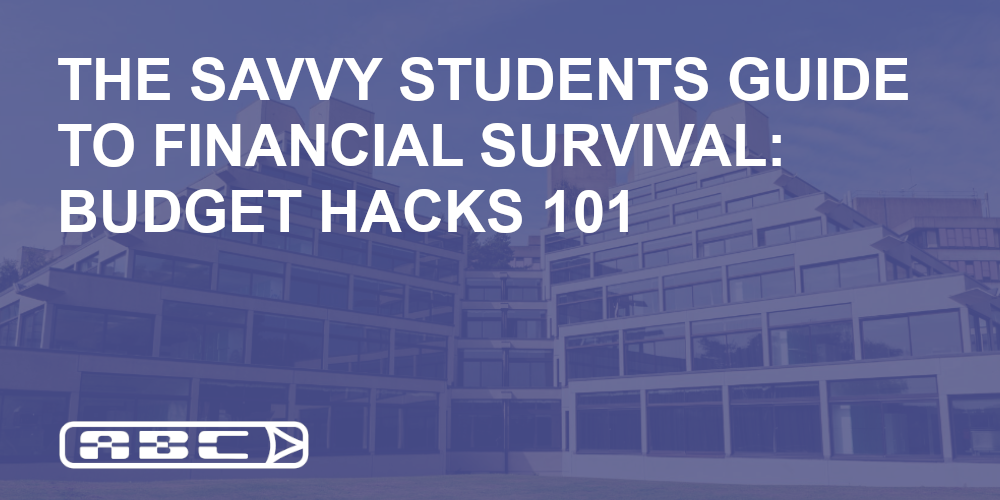
The Savvy Student’s Guide to Financial Survival: Budget Hacks 101
Budgeting is a vital skill for college and university students in Norwich who often face a range of expenses with limited income sources. This financial challenge includes tuition fees, textbooks, housing and food all of which can quickly strain a student’s financial resources. Fortunately, effective budgeting techniques and money-saving strategies tailored to the unique needs of students can help alleviate these financial pressures. This article provides comprehensive guidance on creating and maintaining a practical budget throughout your post-secondary education, enabling you to make informed financial decisions and ensure your academic journey remains financially sustainable.
In essence, budgeting is a lifeline when pursuing higher education, equipping you with the tools to manage your financial responsibilities alongside your educational aspirations. By following the advice presented in this guide, you can take control of your finances and set yourself up for success during your post-secondary education journey, ultimately reducing financial stress and enhancing your overall academic experience.
Create a Financial Plan

The primary and most effective step in the budgeting process involves establishing a routine of meticulously tracking both your incoming finances and expenditures. This practice enables you to gain a deeper understanding of your typical spending habits, allowing you to better allocate your resources. The goal is to prevent excessive spending on non-essential items and prioritise your essential needs.
You have two options for monitoring your income and expenses: you can use a budget-tracking app or opt for the traditional spreadsheet method. Regardless of your choice, the more meticulous you are in recording every dollar, the quicker you will notice positive improvements in your overall financial well-being.
Begin by calculating your monthly income, which may include your student loan, bursaries, grants, any financial support from family members, or earnings from part-time jobs or freelance work. If you receive a lump sum payment for each term, it is advisable to divide it by the number of months in that term for a more accurate monthly representation.
Once you have determined your monthly income, make a list of your expenses. These are the recurring payments you know you must cover each month, such as phone and internet bills, rent, and regular transportation costs. Additionally, factor in essential expenses like groceries, necessary supplies, and items such as course books. Anything remaining after you’ve accounted for your expenses is discretionary income, which can be allocated towards spending or saving as you see fit.
Opt for a Budget Management App or Spreadsheet

Creating a budget might seem simpler compared to adhering to it, but fortunately, there is a range of apps available to provide assistance. These finance and budgeting applications come in diverse forms, making it highly probable that you’ll discover the perfect one tailored to your specific requirements.
In addition to aiding in the initial budget planning process, these apps offer additional benefits such as establishing spending limits for various expense categories and the automatic accumulation of spare change into your savings.
Bundle Up in Chilly Weather

Avoid depending solely on heating when the temperature decreases; opt for warm clothing instead. This choice will prove advantageous when you receive your electricity bill later on.
Prioritise layering as it’s not just a matter of comfort but also involves a bit of scientific reasoning. Opt for fabrics, such as polypropylene thermals, that effectively trap and absorb body heat. Conversely, in summertime when cooling down is essential, breathable materials like cotton are the preferred choice over synthetic fibres.
Restrict Dining Out

Being a student often leads to the inclination to order food as the most convenient option for meals in between and after classes. However, this tendency is frequently the least cost-effective approach to managing your food expenses. A more budget-friendly alternative is to engage in personal grocery shopping and meal preparation at home. Although this approach may seem time-intensive, effective planning and batch cooking can make it quite manageable.
For students, prioritising home-cooked meals presents an excellent opportunity to save money. Collaborating with housemates to prepare meals collectively and even storing leftover portions in the freezer for future consumption throughout the week or month can further enhance cost efficiency. While dining out can serve as a well-deserved treat, the cumulative expenses of restaurant meals can escalate quickly, prompting students to carefully consider the frequency of such outings with friends during their university or college tenure.
Maximise Student Deals

As a student, you bear various financial obligations; however, there’s a silver lining – your student ID opens the door to valuable cost-saving advantages. Your student status allows you to access substantial discounts at a range of places in Norwich and the UK, including retail stores, cinemas, and various participating businesses.
Furthermore, many prominent tech giants, such as Apple and Microsoft, extend generous discounts on their products to students when making purchases.
Explore Part-Time Employment Opportunities

While your primary focus at university should undeniably be your studies, you have the option to utilise your free time to generate income through part-time employment. There is a multitude of job opportunities tailored for students, and a simple online search can readily connect you with part-time job openings in Norwich.
Positions within the retail and hospitality sectors are generally well-suited for students, although if they align with your interests, you can also explore alternatives such as dog walking or babysitting.
Exercise Caution with Your Overdraft

Banks are well aware that once they acquire you as a customer, there’s a high likelihood you’ll remain with them for the long term. This is why they go to great lengths to entice students. You might be enticed by a current account that offers a sizable, complimentary overdraft. If you decide to opt for it, it’s advisable to treat your overdraft primarily as a safety net. The common mistake is regarding an overdraft as free money when, in reality, a negative balance means you’re in debt that will need to be settled once you have incoming funds.
An overdraft can indeed serve as a valuable resource, especially during financially challenging periods when you’re a student with limited income. However, relying on it regularly can lead to a challenging cycle. If you find yourself needing to use your overdraft as a one-time solution, it’s prudent to exercise restraint in your spending once you’ve cleared it to prevent falling back into it.
Purchase Pre-Owned Course Materials

In case you discover a shortage of essential course textbooks in the library, and they aren’t accessible online, you might be compelled to purchase your copies, which can result in significant expenses.
Fortunately, there exists a thriving secondary market where former students, who have completed their studies and no longer require their textbooks, offer them for sale. You can inquire about this option at your university bookshop, library, or student council, or search for relevant information on the internet. However, exercise caution to ensure you obtain the most recent edition, as textbooks often undergo substantial updates from one edition to the next, and you wouldn’t want to miss out on vital revisions.
Hunt for Markdowns with Yellow Tags at the Store

Keep an eye out for those distinctive yellow markdown tags when you’re grocery shopping. Typically, the prime time for these reductions is usually a few hours before the store closes, although it might occur earlier. Typically, you can score approximately a 50% discount, but occasionally, the markdowns can exceed 90%. There’s nothing like brightening up a tough day by snagging a batch of chocolate chip cookies for just 78p.
Below are some indicative times when supermarkets typically offer these reductions, although please note that these times may vary depending on the specific store’s policies.
Tesco – 8:00pm
Sainsbury’s – 7:00pm
Asda – 7:00pm
Morrison’s – 5:00pm
Aldi – 8:00am
Lidl – 9:00am to 12:00pm
Co-op – All throughout the day
Foster a Spare Change Savings Pot

The next time you find yourself with loose change on hand (whether it’s pennies, 5p coins, or even a daring £1 coin), toss it into a jar. Keep adding to it until the jar is brimming, then empty it out. You’ll be amazed at how those seemingly insignificant coins can add up over time. It’s perfect for those little mood-lifting treats or to pay household bills.
To effectively divide your household expenses, it’s crucial to organise a meeting with your housemates. During this gathering, reach a consensus on which bills should be shared, the payment methods to be used, and how any surplus funds will be managed. This approach enables you to save money steadily throughout the year and allocate any extra funds purposefully.
Reduce Energy Consumption

Given the ongoing cost of living challenges that are expected to persist in the coming years, it’s an opportune moment to implement adjustments and reduce energy consumption in your student housing.
Ensure that you deactivate all lighting when it’s not required, power down your devices instead of leaving them on standby, and opt for cold water when laundering your clothes. Additionally, consider installing a smart meter at your residence and routinely record readings to monitor your energy usage, pinpoint areas where you can cut back, and ultimately save on expenses.
Embark on the 1p Savings Challenge

While finances are typically constrained for students, there are various tactics you can employ to set aside money subtly. One such method is the 1p saving challenge, which, by year-end, can accumulate to £667.95 in savings.
The premise of this challenge is straightforward: initiate your savings by setting aside 1p on the first day and incrementally increase the amount by 1p each day. For instance, on the second day, save 2p, and on the third day, allocate 3p, continuing this pattern. You can find further information on commencing the 1p challenge and its progression here.
Curb Impulse Spending Habits

Impulse purchasing poses a significant challenge for individuals, particularly with the ease of online transactions. However, for students, exercising caution regarding impulsive purchases is especially crucial since they can erode the budget allocated for essential needs.
Instead of succumbing to impulse buys, one of the most effective money-saving tips for students involves creating a list of desired items and implementing a 30-day waiting period. Revisit your list at the end of the month, and if you still find yourself desiring or needing the item, and you have the funds available, then go ahead with the purchase. This waiting period serves to eliminate impulsive decision-making tendencies, enabling you to make more prudent financial choices.
In conclusion, managing finances as a student can be a challenging yet essential skill to develop. By adhering to the strategies and tips outlined in this article, students can navigate the financial complexities of their academic journey with greater confidence. From budgeting wisely and exploring student discounts to adopting savvy savings techniques and resisting impulse buying, these practices can collectively contribute to a more financially stable and rewarding university experience. As students apply these principles and cultivate responsible financial habits, they not only ease the burden of limited resources but also pave the way for a more secure financial future beyond their academic years.
As ever, ABC Taxis is available to simplify your daily commute. Require a taxi reservation to reach your preferred study spot. It’s a breeze! Through our user-friendly app or website, you can effortlessly reserve a taxi whenever it suits you. Additionally, should you ever opt to join us as a driver-partner, you’ll be part of a community committed to sustainability and eco-friendliness, as we take great pride in our environmentally conscious fleet. For a hassle-free and eco-responsible journey, make your taxi reservation with ABC Taxis today!